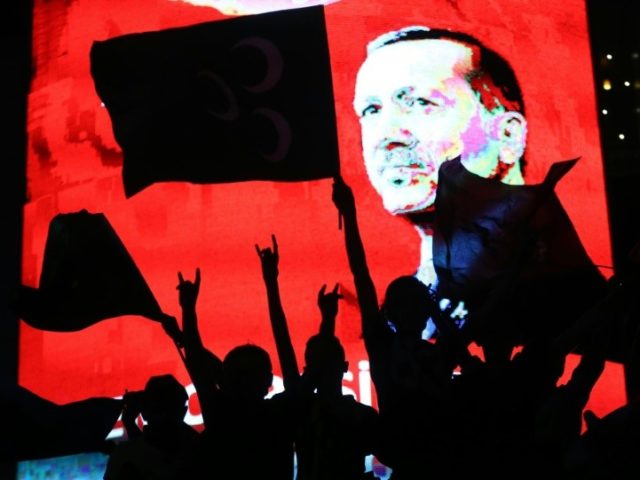Turkish President Recep Tayyip Erdogan has reportedly succeeded in imposing a three-month state of emergency, in response to a failed military coup against his rule, that allows his government to prolong detention times and issue edicts.
The three-month state of emergency, approved by Turkish lawmakers, began Friday as U.S. President Barack Obama warned the Erdogan government against “overreaction” in the wake of the coup attempt, echoing his State Department.
Prior to announcing the measure, the Turkish president indicated that his country’s military would “get fresh blood” in response to the insurrection, according to the Guardian.
The Washington Post (WaPo) reports:
Turkey’s president triumphantly rallied supporters after prayers at a mosque [in the Turkish capital Ankara] Friday as his government announced new details about the state of emergency imposed after an attempted coup.
The changes included extending the period that suspects can be detained without charges to up to a week…
Turkey’s parliament on Thursday approved the three-month state of emergency, which gives Erdogan sweeping new powers. He has said the state of emergency will counter threats to Turkish democracy, though critics are urging restraint because they fear the measure will violate basic freedoms.
Meanwhile, during a joint press conference with the Mexican president at the White House, Obama told reporters:
We have indicated is our strong belief and hope that as the dust settles, there is not an overreaction that could in some fashion lead to a curtailment of civil liberties or a weakening of the ability of legitimate opposition, or journalists through legal processes to voice their concerns, and to petition their government…
[The United States] would encourage that the manner in which this coup is investigated and people are held accountable and justice is done, is consistent with rule of law and the basic freedoms.
Obama reiterated that his administration condemns the revolt, denying claims by Turkish government officials that the United States was involved.
Erdogan addressed hundreds of people outside the Ankara mosque to announce the beginning of the state of emergency.
“Victory belongs to the faithful,” the Islamist president said.
“Here is the army, here is the commander!” the crowd in Ankara chanted, reports WaPo, adding:
They also called for the reintroduction of the death penalty for use against coup plotters, a request that Erdogan has said he would consider despite concerns that it would violate Turkey’s international commitments and rupture ties with Europe.
The Post quotes Erdogan as adding that “pro-government protesters faced down guns and tanks during the July 15 uprising and accused followers of U.S.-based cleric Fethullah Gulen, the alleged director of the uprising, of mocking the Turkish people.”
Gulen, who lives in self-imposed exile in Pennsylvania, had denied being involved in the attempted coup.
The coup was carried out by factions of the Turkish military, which considers itself the guardian of the country’s secular constitution.
Erdogan has demanded that the United States, Turkey’s NATO ally, extradite Gulen, a legal permanent U.S. resident.
In response to the Turkish leader’s request, President Obama, once again echoing members of his team, told reporters Friday:
I told President Erdogan that they should present us with evidence that they think indicates the involvement of Mr. Gulen or anybody else who is here in the United States, and it would be processed the way that it is always processed and that we would certainly take any allegations like this seriously.
But America’s governed by rules of law, and those are not ones that the president of the United States or anybody else can just set aside for the sake of expediency, even when we are deeply supportive of Turkish democracy and even when we care deeply about any attempts to overthrow their government or any other illegal actions. We’ve got to go through a legal process
Erdogan has already either suspended or detained an estimated 50,000 people as part of a purge of the army, police, and the courts that expanded to universities and schools following the coup attempt.
Many of those individuals have been targeted for alleged links to Gulen.
According to official government figures, about 232 people were killed and another 1,541 injured as a result of the coup attempt.

COMMENTS
Please let us know if you're having issues with commenting.